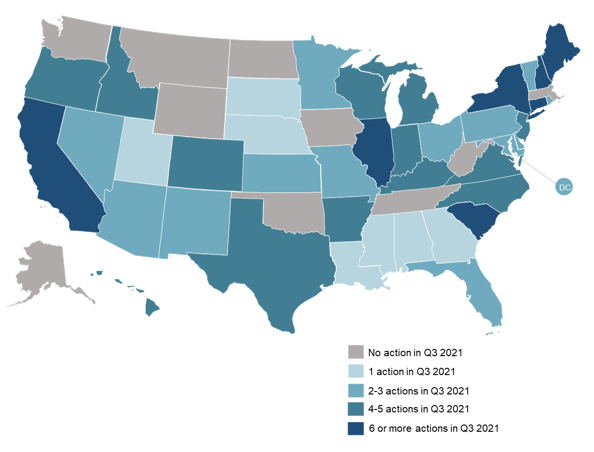The 50 States of Solar: States Take Steps to Expand Community Solar Programs in Q3 2021
Raleigh, N.C. – (October 20, 2021) The N.C. Clean Energy Technology Center (NCCETC) released its Q3 2021 edition of The 50 States of Solar. The quarterly series provides insights on state regulatory and legislative discussions and actions on distributed solar policy, with a focus on net metering, distributed solar valuation, community solar, residential fixed charges, residential demand and solar charges, third-party ownership, and utility-led rooftop solar programs.
The report finds that 40 states, plus the District of Columbia, took some type of distributed solar policy action during Q3 2021 (see figure below), with the greatest number of actions continuing to address net metering policies (55), community solar policies (44), and residential fixed charge or minimum bill increases (34). A total of 174 distributed solar policy actions were taken during Q3 2021, with the greatest number of actions taken in Illinois, California, Maine, New York, South Carolina, and Connecticut.
Q3 2021 Policy Action on Net Metering, Rate Design, and Solar Ownership

The report identifies three trends in solar policy activity taken in Q3 2021: (1) states expanding existing community solar programs, (2) state lawmakers pursuing expansive clean energy bills including distributed solar components, and (3) states offering distributed generation customers multiple compensation options.
“We’ve seen a steady increase in community solar policy activity over the years, with new states authorizing community solar and other states continuing to modify existing programs,” noted Autumn Proudlove, lead author of the report and Senior Policy Program Director at NCCETC. “This quarter, several states took steps to expand existing community solar programs, such as increasing program caps or system size limits.”
The report notes the top five distributed solar policy actions of Q3 2021:
- Illinois lawmakers enacting expansive clean energy legislation including major community solar and net metering provisions;
- The New York State Energy Research and Development Authority launching the Inclusive Community Solar Adder program;
- Kentucky regulators directing Kentucky Utilities and Louisville Gas & Electric to continue offering traditional retail rate net metering;
- Delaware legislators approving community solar program modifications; and
- The Sacramento Municipal Utility District Board of Directors approving a net metering successor tariff in California.
“State lawmakers are increasingly considering large bills that address the solar industry from multiple angles, ” observed Brian Lips, Senior Policy Project Manager at NCCETC. “A few states took large steps to expand the solar market this quarter, with other states continuing to set the stage for future efforts.”
View the 50 States of Solar 2021 Q3 Update Executive Summary
View and Purchase the 50 States of Solar 2021 Q3 Update FULL Report
View other 50 States Reports – Solar, Grid Modernization and Electric Vehicles
ABOUT THE N.C. CLEAN ENERGY TECHNOLOGY CENTER
The N.C. Clean Energy Technology Center, as part of the College of Engineering at North Carolina State University, advances a sustainable energy economy by educating, demonstrating and providing support for clean energy technologies, practices and policies. It serves as a resource for innovative, sustainable energy technologies through technology demonstration, technical assistance, outreach and training. For more information about the Center, visit: http://www.nccleantech.